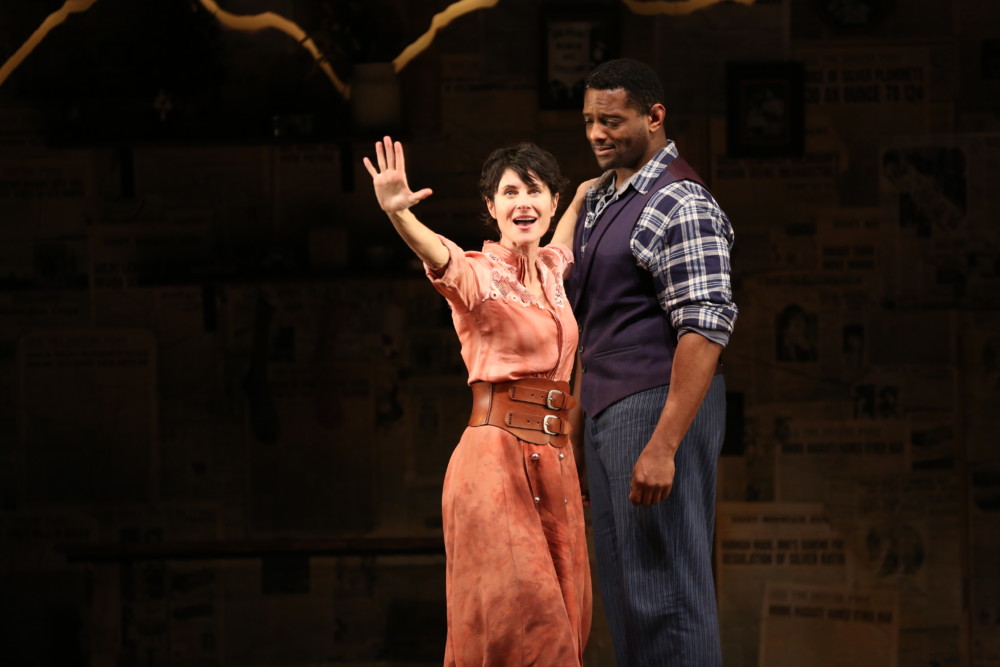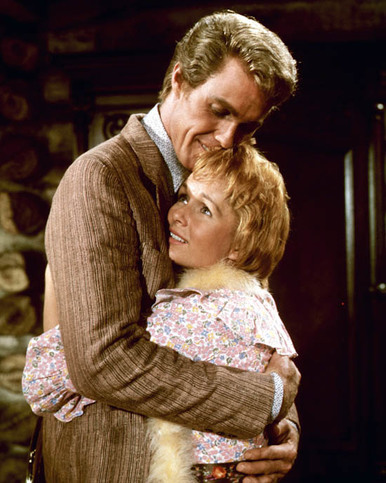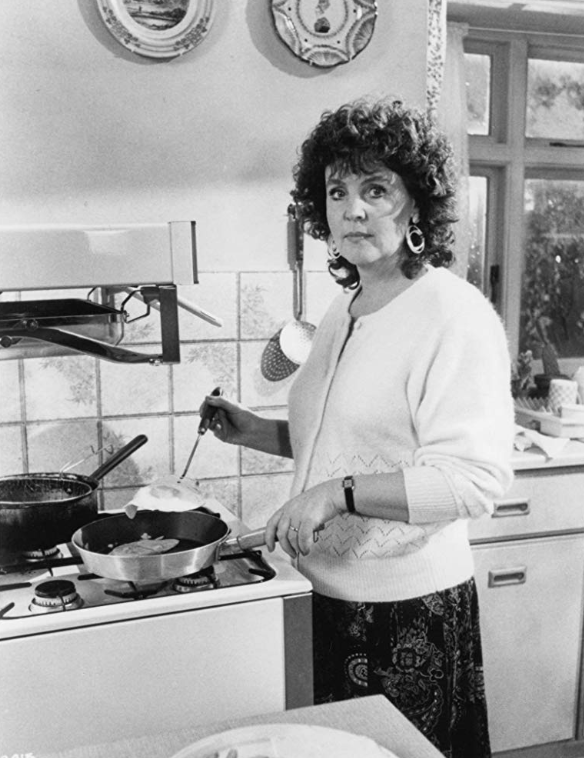An Amusement Column
by Harry Haun
THOROUGHLY MODERN MOLLY: Guess who “ain’t down yet”? Margaret Tobin Brown, that’s who. Commonly called “Maggie” in real life, she was eternally re-tagged “Molly” by Meredith Willson when he musicalized a fictional facsimile of her life. (He thought it sounded better.) . . . As he told it 60 years ago, The Unsinkable Molly Brown survived not only the flush of affluence that generally accompanies a gold strike, but also the sinking of RMS Titanic and the hissing of Denver’s snooty society unimpressed by the European royalty she brought back home with her.
Far from down, Mrs. Brown is popping out of the bandbox a brand-new (and truer) creation than what could be found on Broadway in 1960-61 and in movie theaters in 1964. Its re-creators are not shy about calling this a world premiere, one that uses Willson’s music (from this and other shows) but tells a totally different story. . . . The Transport Group unveils the results Feb. 25 at Abrons Arts Center, with Beth Malone in the title role and David Aron Damane as her husband, J.J. (aka “Leadville Johnny”) Brown. Confidently, its run’s already been extended two weeks to April 5.
Two driving forces are behind this revival: director-choreographer Kathleen Marshall and adapter Dick Scanlan, who first cranked it up at the Denver Center Theater Company’s Colorado New Play Summit in February 2009. Scanlan became involved in this project when he and screenwriter Richard Morris adapted Morris’ Thoroughly Modern Millie for the stage. Morris had also done the libretto for The Unsinkable Molly Brown and was never satisfied with it, despite the star-making, Tony-winning turn it provided Tammy Grimes. A Winter Garden run of 532 performances and one preview—plus a couple of successful national tours—didn’t ease his regrets, either. . . . “He kept saying, ‘Whenever we’re done fixing Millie, we got to fix Molly,’” recalls Scanlan, who took up that cause after Morris’ death in 1996.
“The original Broadway production, which was very different from the film, now feels like an extended episode of The Beverly Hillbillies where rubes strike it rich and move to the big city,” avers Marshall. “Molly’s actual life was much more interesting and complicated. She was sort of a laser for social justice. She championed all kinds of causes—child welfare, the women’s suffrage movement, historic preservation, education and literacy and advocating on behalf of unions for the miners.”
Some 20 Meredith Willson melodies made this cut. Half come from the original (notables like “I Ain’t Down Yet,” “I’ll Never Say No,” “Belly Up to the Bar, Boys”), half were cut from other shows, one comes from the movie version (“He’s My Friend”), and, in some cases, just the melody is used and Scanlan supplies new lyrics.
He’s the one who knows where the other Willsons come from. “There’s a song called ‘The Wonderful Plan’ that he would put in—and take out of–every single show, until his last one, 1491. I rewrote some of the lyrics to this, but the basic hook is his. . . . There’s a song called ‘If We Can-Can,’ which is a dance number that is refurbished from a song cut from The Music Man called ‘Too Soon Old.’ An old German couple sang it in early draft of the show. . . . And there’s a beautiful song called ‘Share the Luck,’ which he wrote for the Red Cross right after Music Man opened. They called up and asked, ‘Would you write us a theme song?’ and he did.”
Previewers report that Molly’s father and her raucous sibling rivalry have been eliminated. Instead, she arrives apparently by foot from Missouri at a silver mine owned by Horace Tabor and wife Baby Doe (how’s that for Colorado local-coloring? ). . . . She learns her readin’ and writin’ from a woman whose husband is killed in a mine explosion, thus inflaming and activating Molly’s social consciousness. She’s not above insinuating her way into high society by spiking the tea of Denver dowagers.
The turbulent relationship of Molly and J.J. rarely rose above fun fights in the 1960 musical. Now, it’s taken more seriously, according to Malone. “In our version, they came to the realization that they couldn’t live together anymore. They never divorced. The beautiful thing about telling the truth is that, after they split, after that not-very-commercial ending, they wrote these gorgeous, beautiful love letters to each other for years. They were separated for years. She went and lived on the continent, and he went back to Leadville, but they wrote to each other, and those letters exist still. Their love story goes on even though they were not in the same room.”
Debbie Reynolds was playing to the end of her 25-year string at M-G-M when The Unsinkable Molly Brown came up for casting. It was her favorite role and her only Oscar nomination, but she wasn’t her home studio’s first choice. Shirley MacLaine was–only she came with a steep price tag. Recognizing it was her last great shot at a stellar showcase, Debbie went to Shirley while the financial haggling was going on and asked her to pass on the part. “Some day, I’ll make it up to you some way,” she promised. . . . Fast-forward 26 years. When Mike Nichols decided to film Carrie Fisher’s Postcards From the Edge, he hired Meryl Streep to play a facsimile of Carrie, and the character came with a movie-star mom a perfect fit for Shirley. Promise kept.
BEYOND VERONA, WAY BEYOND: Romeo and Juliet is being dizzily recycled these days Off-Broadway, thoroughly camouflaged first as a broad, manic comedy and then as an exuberant, high-energy dance. . . . The comedy, Romeo & Bernadette, just finished a run at A.R.T./New York Theaters but will return March 26 for extra innings at Theater Row’s Theater 3. Justin Ross Cohen, from the classic logo lineup of A Chorus Line, directed and choreographed this Amas Musical Theater presentation. . . Its Romeo (Nikita Burshteyn) time-travels from 16th century Verona to Brooklyn of 1960, lands in the middle of a gang-war and takes a tough-talking mobster princess (Anna Kostakis) for his Juliet. Judy McLane, who has a history of hanging with Mamma Mia! and Johnny Guitar, walks away with the show as a moll mom. . . . Almost entirely without words, Beyond Babel conveys the passion that drove Shakespeare’s star-crossed lovers to tragedy. A theatrical dance show created by Keone and Mari Madrid and Hideaway Circus, this San Diego import plays The Gym at Judson Theater extended through April 30 . . . . Both are worth your time and attention.

Kendal Sparks, Charles Busch (as Lily Dale, early years: much to confess), Christopher Borg, Nancy Anderson, Jennifer Van Dyck and Howard McGillin (Photo Carol Rosegg)
X MARKS THE SPORT: Director Carl Andress insists two plays are going on these days at the Cherry Lane. Patrons are privy to just one, the one being pitched across the footlights: The Confession of Lily Dare—but backstage and upstairs, it’s Noises Off, with all the quick changes of costumes, wigs, makeup and hair styles the cast must make throughout the show. So far, thankfully, the audience is none the wiser.
By any other name, The Confession of Lily Dare is The Sin of Madelon Claudet (Helen Hayes’ Oscar-winning film debut) or Madame X and Frisco Jenny (two strikes for Ruth Chatterton)—the plight of the unwed mother who spirals ever-downward into Hollywood’s pre-Code vat of schmaltz and degradation. Charles Busch, as title player and playwright, welcomes the deep dive and makes it a giddy gutter-crawl.
He arrives, fresh from the convent, in Pollyanna Pickford curls and ends up a rust-red hard-bitten type much the worse for wearing motherhood. . . . An opposite gamut is run by the show’s Most Valuable Player, Jennifer Van Dyck, racking up a quirky quartet of hysterically funny dames from Lily’s tough-as-nails prostitute aunt to her cultivated opera-singing daughter. Once, in exasperation, she rails, “My mother, a bordello madam. My mother, a murderer. My mother, a cabaret performer!”
There’s a joke there—and an inside one, at that: On March 9, the multi-talented Busch will be honored as a performer, writer, director and drag artist in theater, cabaret and film at The 35th Annual Bistro Awards at the Gotham Comedy Club.
A campy follower of the genre, Busch will spend his next night off, Feb. 24, at Film Forum, providing the introductory notes for the 6:30 screening of the last (1966) Madame X, Lana Turner, who has the outlandish luxury of being defended of a murder charge by the son (Keir Dullea) she had abandoned decades before.
HAPPY SHIRLEY VALENTINE’S DAY: Two days after Valentine’s Day 31 years ago, Willy Russell’s one-woman show opened on Broadway at the Booth Theater. It wound up running for 324 performances–first with Pauline Collins (who won a Tony to go with her Olivier) and then with Ellen Burstyn and Loretta Swit. . . . At the opening-night party, I smoked the last of my cigarettes, then I smoked the last of my date’s, and then I decided, as I had many times before, to give up smoking altogether. I’m here to tell you 31 years later that it really was my last cigarette. . . . Tom Jones, the fantastic lyricist and book writer of The Fantasticks, turned 92 on Feb. 17. “Since my birthday happens to occur on President’s Day,” he said, “I have decided to run. I’m going for the alte kaker vote (which is enormous).”



















